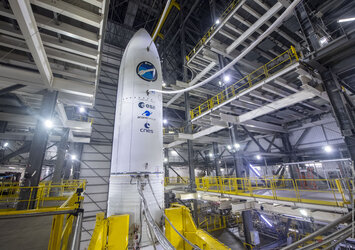

Ariane 6 before wet dress rehearsal
Thank you for liking
You have already liked this page, you can only like it once!
First clear view of the Ariane 6 rocket that will launch into space on the launch pad at Europe’s Spaceport in French Guiana, 20 June 2024.
Europe’s new rocket Ariane 6 went through a full ‘wet dress rehearsal’ it providing an exciting sneak peek of what’s to come, stopping just seconds before engine ignition and of course, lift-off.
Similar to rehearsals carried out with a test rocket during combined test campaigns, this time the real flight model, its payloads, the launch pad and teams on the ground went through every step of launch operations; from pumping 180 tonnes of propellant – liquid oxygen and liquid hydrogen – into the waiting Ariane 6, the rollback of the mobile gantry, running all of the ground control software and more.
One of the first steps was to roll back the colossal 90-m tall Ariane 6 mobile gantry building 120 m away from the launch pad – the first moment the complete rocket stood free.
Pumping fuel into the Ariane 6 then took about 3,5 hours, as technicians at the control centre first began by slowly cooling the pipes, valves, tanks and engines from the tropical temperatures in French Guiana of about 30 degrees Centigrade down to the super-chilled temperatures of the soon-incoming cryogenic fuels.
As much an art as engineering, the propellants used by Europe’s new rocket Ariane 6 are supercooled to –180°C for the oxygen and –230°C for the hydrogen fuel. At these temperatures, any humidity already in the pipes would immediately freeze and could lead to blocked valves. To avoid this, any hint of air or moisture from the atmosphere was flushed out of the system by the inert (unreactive) gas, nitrogen, before fuelling began.
Once the tanks were full, teams continued topping them up as the liquid fuels would gradually boil away in the Sun. The rocket was subsequently drained of fuel in preparation for launch.
-
CREDIT
ESA–L. Bourgeon -
LICENCE
ESA Standard Licence

First glimpse of Ariane 6 flight model 1 on the launch pad

Ariane 6 on the launch pad before wet dress rehearsal

Wet dress rehearsal for Ariane 6 with a puddle

Ariane 6 flight model-1 standing tall

